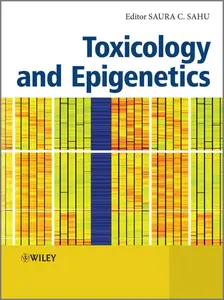- Témaindító
- #1
- Csatlakozás
- 2024.09.10.
- Üzenetek
- 25,854
- Reakció pontszám
- 8
- Díjak
- 5
- Kor
- 37

Free Download Toxicology and Epigenetics By
2012 | 668 Pages | ISBN: 111997609X | PDF | 8 MB
Epigenetics is the study of both heritable and non-heritable changes in the regulation of gene activity and expression that occur without an alteration in the DNA sequence. This dynamic and rapidly developing discipline is making its impact across the biomedical sciences, in particular in toxicology where epigenetic differences can mean that different individuals respond differently to the same drug or chemical.Toxicology and Epigenetics reflects the multidimensional character of this emerging area of toxicology, describing cutting-edge molecular technologies to unravel epigenetic changes, the use of in vivo and in vitro models, as well as the potential use of toxicological epigenetics in regulatory environments. An international team of experts consider the interplay between epigenetics and toxicology in a number of areas, including environmental, nutritional, pharmacological, and computational toxicology, nanomaterials, proteomics and metabolomics, and cancer research.Topics covered include:environment, epigenetics and diseasesDNA methylation and toxicogenomics chromatin at the intersection of disease and therapyepigenomic actions of environmental arsenicalsenvironment, epigenetics and cardiovascular healthtoxicology, epigenetics and autoimmunityocular epigenomics: potential sites of environmental impact in development and diseasenuclear RNA silencing and related phenomena in animalsepigenomics - impact for drug safety sciencesmethods of global epigenomic profilingtranscriptomics: applications in epigenetic toxicologyToxicology and Epigenetics is an essential insight into the current trends and future directions of research in this rapidly expanding field for investigators, toxicologists, risk assessors and regulators in academia, industry and government.Content: Chapter 1 Introduction (pages 1-3): Saura C. SahuChapter 2 Environment, Epigenetics, and Diseases (pages 5-24): Robert Y. S. Cheng and Wan?yee TangChapter 3 DNA Methylation and Toxicogenomics (pages 25-50): Deepti DeobagkarChapter 4 Chromatin at the Intersection of Disease and Therapy (pages 51-71): Delphine Quenet, Marcin Walkiewicz and Yamini DalalChapter 5 Molecular Epigenetic Changes Caused by Environmental Pollutants (pages 73-109): Solange S. Lewis, Gregory J. Weber, Jennifer L. Freeman and Maria S. SepulvedaChapter 6 Epigenetic Mediation of Environmental Exposures to Polycyclic Aromatic Hydrocarbons (pages 111-127): Bekim Sadikovic and David I. RodenhiserChapter 7 Epigenomic Actions of Environmental Arsenicals (pages 129-148): Paul L. Severson and Bernard W. FutscherChapter 8 Arsenic?Induced Changes to the Epigenome (pages 149-190): Kathryn A. Bailey and Rebecca C. FryChapter 9 Environmental Epigenetics, Asthma, and Allergy: Our Environment's Molecular Footprints (pages 191-203): Stephanie Lovinsky?Desir and Rachel L. MillerChapter 10 miRNAs in Human Prostate Cancer (pages 205-217): Ernest K. Amankwah and Jong Y. ParkChapter 11 Environment, Epigenetics, and Cardiovascular Health (pages 219-239): Sanjukta Ghosh and Andrea BaccarelliChapter 12 Toxicology, Epigenetics, and Autoimmunity (pages 241-260): Craig A. Cooney and Kathleen M. GilbertChapter 13 Toxicoepigenomics in Lupus (pages 261-274): Donna Ray and Bruce C. RichardsonChapter 14 Ocular Epigenomics: Potential Sites of Environmental Impact in Development and Disease (pages 275-295): Kenneth P. MittonChapter 15 Nuclear RNA Silencing and Related Phenomena in Animals (pages 297-315): Radek Malik and Petr SvobodaChapter 16 Epigenetic Biomarkers in Cancer Detection and Diagnosis (pages 317-338): Ashley G. Rivenbark and William B. ColemanChapter 17 Epigenetic Histone Changes in the Toxicologic Mode of Action of Arsenic (pages 339-356): John F. Reichard and Alvaro PugaChapter 18 Irreversible Effects of Diethylstilbestrol on Reproductive Organs and a Current Approach for Epigenetic Effects of Endocrine Disrupting Chemicals (pages 357-364): Shinichi Miyagawa, Ryohei Yatsu, Tamotsu Sudo, Katsuhide Igarashi, Jun Kanno and Taisen IguchiChapter 19 Epigenomics - Impact for Drug Safety Sciences (pages 365-385): Harri Lempiainen, Raphaelle Luisier, Arne Muller, Philippe Marc, David Heard, Federico Bolognani, Pierre Moulin, Philippe Couttet, Olivier Grenet, Jennifer Marlowe, Jonathan Moggs and Remi TerranovaChapter 20 Archival Toxicoepigenetics: Molecular Analysis of Modified DNA from Preserved Tissues in Toxicology Studies (pages 387-407): B. Alex MerrickChapter 21 Nanoparticles and Toxicoepigenomics (pages 409-426): Manasi P. Jain, Angela O. Choi and Dusica MaysingerChapter 22 Methods of Global Epigenomic Profiling (pages 427-443): Michael W. Y. Chan, Zhengang Peng, Jennifer Chao Weber, Ying?Wei Li, Matthew T. Zuzolo and Huey?Jen L. LinChapter 23 Transcriptomics: Applications in Epigenetic Toxicology (pages 445-458): Pius JosephChapter 24 Carcinogenic Metals Alter Histone Tail Modifications (pages 459-474): Yana Chervona and Max CostaChapter 25 Prediction of Epigenetic and Stochastic Gene Expression Profiles of Late Effects after Radiation Exposure (pages 475-510): Yoko Hirabayashi and Tohru InoueChapter 26 Modulation of Developmentally Regulated Gene Expression Programs through Targeting of Polycomb and Trithorax Group Proteins (pages 511-538): Marjorie Brand and F. J. DilworthChapter 27 Chromatin Insulators and Epigenetic Inheritance in Health and Disease (pages 539-567): Jingping Yang and Victor G. CorcesChapter 28 Bioinformatics for High?Throughput Toxico?Epigenomics Studies (pages 569-588): Maureen A. Sartor, Dana C. Dolinoy, Laura S. Rozek and Gilbert S. OmennChapter 29 Computational Methods in Toxicoepigenomics (pages 589-593): Joo Chuan TongChapter 30 Databases and Tools for Computational Epigenomics (pages 595-614): V. Umashankar and S. GurunathanChapter 31 Interface of Epigenetics and Carcinogenic Risk Assessment (pages 615-630): Paul NioiChapter 32 Epigenetic Modifications in Chemical Carcinogenesis (pages 631-643): Igor P. Pogribny, Igor Koturbash and Frederick A. BelandChapter 33 Application of Cancer Toxicoepigenomics in Identifying High?Risk Populations (pages 645-652): Mukesh Verma and Krishna K. Banaudha
Buy Premium From My Links To Get Resumable Support,Max Speed & Support Me
Code:
⚠
A kód megtekintéséhez jelentkezz be.
Please log in to view the code.
